Stockton University News - June 2016
Dear Alumni and Friends,
Greetings from Stockton University! This summer, I invite you to return to campus
or one of our instructional sites, or join us on the Vision Tour in New Jersey this summer. Here are just a few highlights
of what has been happening at Stockton:
Stockton Welcomes Lori A. Vermeulen as New Provost and Vice President for Academic
Affairs
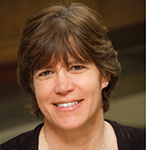
An opportunity to do undergraduate research with a faculty member changed the life
of Vermeulen. In her new role at Stockton, Vermeulen is intent on providing the resources
to enable more students to have that experience.
The Stockton community is pleased to welcome Lori A. Vermeulen to the University as
the new provost and vice president for Academic Affairs.
An opportunity to do undergraduate research with a faculty member changed the life
of Vermeulen. In her new role at Stockton, Vermeulen is intent on providing the resources
to enable more students to have that experience.
“My goal is to empower the faculty to do their best work through high-impact practices
with students,” Vermeulen said. High-impact practices include research, internships
and study abroad, which “can really show a student what their life could be like if
they pursue that discipline,” she explained. “It happened to me.”
Vermeulen comes to Stockton from West Chester University of Pennsylvania (WCU), where
she served as dean of the College of Arts and Sciences, the largest college at an
institution
that serves over 16,000 students.
In her new position, Vermeulen is responsible for providing vision, leadership and
strategic planning for Stockton’s academic core, supervising seven schools and other
offices within the Division of Academic Affairs, and for the process of recruiting,
hiring, mentoring and evaluating faculty.
After earning her bachelor’s degree, Vermeulen worked as a chemist in quality control
at Merck’s Chemical Manufacturing Division, and later Merck, Sharpe, & Dohme Research
Laboratories manufacturing compounds for possible use in clinical drug trials. She
then returned to study at Princeton University, where she earned her master’s degree
and Ph.D. in Chemistry.
Coastal Research Center Receives Prestigious Award from the Jersey Shore Partnership
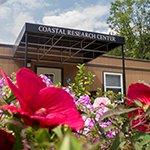
Congratulations to Stewart Farrell, executive director of the Coastal Research Center,
and his team for receiving the Tom Gagliano Leadership Award for Educational Excellence.
Stockton University’s Coastal Research Center received the Tom Gagliano Leadership
Award for Educational Excellence from the Jersey Shore Partnership during its Summer
Celebration and Visionary Leadership Awards on June 6.
The Coastal Research Center received a commendation for its “exemplary dedication
and steadfast commitment to the Jersey Shore” from the Senate and General Assembly
of the State of New Jersey.
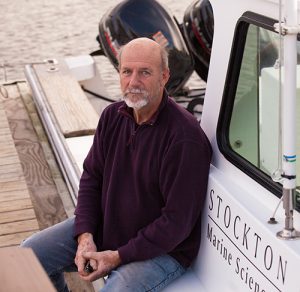
Congratulations to Stewart Farrell, executive director of the Coastal Research Center,
and his team for receiving this prestigious honor.
Stockton’s Coastal Research Center (CRC) was created in 1981 to assist local municipalities
with coastal environmental issues related to recurring storm damage and shoreline
retreat. Since its inception, the CRC has been working on shoreline monitoring and
assessment programs with the State of New Jersey and several municipalities in New
Jersey.
“It has been a unique pleasure to work for 35 years with Stockton graduates studying
both the forces making changes to the Jersey Shore and the impacts of those forces.
The Coastal Research Center would not exist today had not a sizable number of Stockton
students agreed to serve as field crew, mature into full-time staff and together,
succeed in making the CRC into one of New Jersey’s premier scientific study institutes,”
Farrell said.
Learn more about the Coastal Research Center.
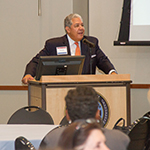 William J. Hughes Center for Public Policy Hosts Student Outcomes Symposium More than
200 higher education leaders convened to share best practices at the Student Outcomes
Symposium, hosted by the William J. Hughes Center for Public Policy at Stockton University
on June 15.
William J. Hughes Center for Public Policy Hosts Student Outcomes Symposium More than
200 higher education leaders convened to share best practices at the Student Outcomes
Symposium, hosted by the William J. Hughes Center for Public Policy at Stockton University
on June 15.
More than 200 higher education leaders convened to share best practices at the Student
Outcomes Symposium, hosted by the William J. Hughes Center for Public Policy at Stockton
University on June 15.
The symposium explored students’ academic success, workforce preparation and civic
participation, and was attended by career counselors, academic advisers, admissions
counselors and employers from 32 colleges and universities.
Students come first at Stockton University. Giving our students the skills and abilities
needed to learn for a lifetime and to start successful careers is at the heart of
the missions of our colleges and universities. This is the means by which we build
a more prosperous and civil New Jersey. Only truly educated citizens can protect our
special American sense of opportunity, liberty and equality.
I had the pleasure of serving on a leadership panel with David Payne, vice president
and chief operating officer of Educational Testing Service Global Education Division,
and Hasani C. Carter, who currently serves as the state director of the New Jersey
Educational Opportunity Fund (EOF) within the Office of the Secretary of Higher Education.
David Payne focused on student outcomes from a global perspective and about how we
measure them and for what purposes. He stressed ongoing efforts to measure outcomes
in a meaningful way for students, educators and employers, and growing interest in
evidence-based assessment of civic learning.
Carter outlined the College Success Collaborative, an initiative of Secretary of Higher
Education Rochelle Hendricks which involves pre-tertiary, higher education and community-based
organizations. The initiative also researches the broad set of skills needed to succeed
beyond college and the workplace, such as tolerance for others and global awareness.
Darryl Greer, a Senior Fellow of the Hughes Center’s Higher Education and Strategic
Information and Governance (HESIG) project, presented research on student attitudes
toward college value and on counseling and advising services.
The HESIG research reveals recent college graduates believe the most important college
outcome is “to get a better job,” with 30 percent naming that as their top priority.
One in three students says colleges are doing “extremely well” in preparing them for
a job and career.
Daniel J. Douglas, director of the Hughes Center, pointed to the research where students
did not think civic participation was important to employers. However, a 2015 survey
conducted by Hart Research Associates for the American Association for Colleges and
Universities (AAC&U), reported that 86 percent of employers surveyed said that regardless
of major, college and university students should “take courses that build the civic
knowledge, skills, and judgment essential for contributing to a democratic society.”
View more photos from the symposium.
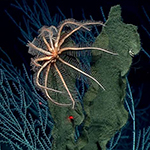
Associate Professor of Biology Tara Luke Serves During NOAA Marianas Trench Deep Sea
Expedition.
From behind her computer screen, Tara Luke, associate professor of Biology, will dive
deep into the dark, frigid waters of the western Pacific Ocean to help identify marine
life, possibly some new species.
From behind her computer screen, Tara Luke, associate professor of Biology, is diving
deep into the dark, frigid waters of the western Pacific Ocean to help identify marine
life, possibly some new species. Luke is a shore-based scientist for the National
Oceanic and Atmospheric Administration’s (NOAA) exploration of the deepest place on
the planet, the Marianas Trench, from the research vessel Okeanos Explorer.
Luke is part of a team of scientists contributing live commentary on the expedition
while viewing footage from NOAA’s remotely operated vehicle known as the Deep Discoverer
daily for 8-10 hours from now through Sunday, July 10, beginning at 5 p.m. ET. An
online livestream will be available worldwide for anyone to explore the deep sea along with the scientists.
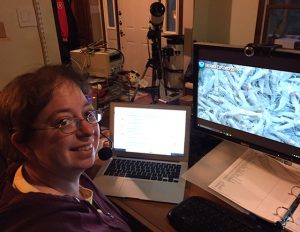
June 17 marked the start of the expedition’s third phase. During phase two, scientists
used sonar to map areas of the trench to identify geographic features of interest
such as basins, craters and seamounts (underwater mountains) that may attract colonies
of sea life. Luke was an on-shore scientist during phase one and said that “the most
exciting part was discovering a hydrothermal vent that had never been seen before.” Chemosynthetic
organisms that use chemicals instead of sunlight to create their food inhabit regions
with hydrothermal vents.
Previously, Luke participated as a shore-based scientist for a NOAA expedition off
the Atlantic Ocean in 2014 that looked at submarine canyons along the New England
seamount chain. As a post-doctoral researcher, she dove 2,512 meters below the ocean
in Alvin, the U.S. Navy’s manned deep-ocean research submersible that has been operated
by Woods Hole Oceanographic Institution for more than half a century.
“I loved being able to go out to sea to see these places,” she said, and with NOAA’s
marine technology she is able to continue exploring these places from Stockton University.
Locally, Luke studies artificial reefs that attract colonies of coral, mussels and
fish such as tautog and sea bass. She looks at the genetic diversity of corals and
microorganisms to predict their ability to withstand change. “Knowing what’s out there
and being able to identify species helps us document biodiversity,” she explained.
I hope you enjoy reading this newsletter!
Harvey Kesselman
President, Stockton University



 William J. Hughes Center for Public Policy Hosts Student Outcomes Symposium More than
200 higher education leaders convened to share best practices at the Student Outcomes
Symposium, hosted by the William J. Hughes Center for Public Policy at Stockton University
on June 15.
William J. Hughes Center for Public Policy Hosts Student Outcomes Symposium More than
200 higher education leaders convened to share best practices at the Student Outcomes
Symposium, hosted by the William J. Hughes Center for Public Policy at Stockton University
on June 15. 



